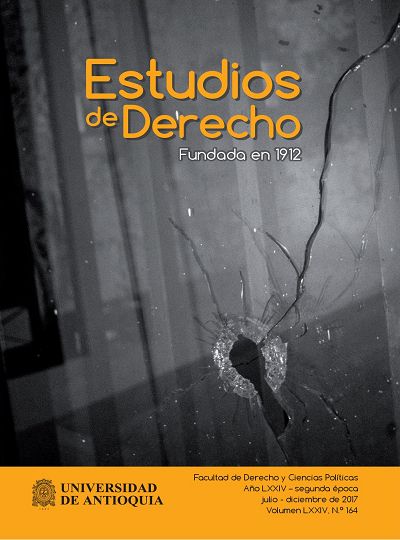The effects of constitutional justice against the silence of the legislator and of the law in Colombia
DOI:
https://doi.org/10.17533/udea.esde.v74n164a02Keywords:
unconstitutional legislative omission, unconstitutionality due to legislative omission, absolute legislative omission, relative legislative omission, silence of the law, silence of the legislatorAbstract
This text has as its main purpose the study of the unconstitutional legislative omission, wherever there is a confrontation between, on the one hand, the faculty of the Constitutional Court to exercise control of the laws issued by the legislator, and on the other hand, the Congress´ freedom of legislative configuration. For this study we depart from the international doctrine and the jurisprudence of Constitutional Court of Colombia, analyzing them together to identify the coincidences, differences, definitions, methods as well as solutions proposed to this constitutional matter.
Downloads
References
Alemania, Tribunal Constitucional Federal (15 de marzo de 1952), Die Rechtsprechung des Bundesverfassungsgerichts zur Verfassungsbeschwerde [MP Franz Wessel], Berlín.
Alemania, Tribunal Constitucional Federal (29 de enero de 1969), citado en Villaverde Menéndez, I. (1997). La inconstitucionalidad por omisión. Madrid, España: McGraw-Hill.
Bazán, V. (2014). Control de las omisiones inconstitucionales e inconvencionales. Bogotá, Colombia: Fundación Konrad Adenauer.
Capitant, H. (1986). Vocabulario jurídico. Buenos Aires, Argentina: Depalma.
Celemín, A. (2016). El exhorto al legislador. Revista de Derecho Público, Número 36. Bogotá, Colombia: Universidad de los Andes. DOI: http://dx.doi.org/10.15425/redepub.36.2016.04
Colombia, Asamblea Nacional Constituyente, (4 de julio de 1991). Constitución Política de Colombia de 1991. Bogotá.
Corte Constitucional de Colombia, Sentencia T- 081 (1993).
Corte Constitucional de Colombia, Sentencia C- 473 (1994).
Corte Constitucional de Colombia, Sentencia C- 543 (1996).
Corte Constitucional de Colombia, Sentencia C- 956 (1999).
Corte Constitucional de Colombia, Sentencia C- 043 (2003).
Corte Constitucional de Colombia, Sentencia C- 371 (2004).
Corte Constitucional de Colombia, Sentencia C- 283 (2011).
Corte Constitucional de Colombia, Sentencia C- 545 (2011).
Corte Constitucional de Colombia, Sentencia C- 577 (2011).
Corte Constitucional de Colombia, Sentencia C- 238 (2012).
Corte Constitucional de Colombia, Sentencia C- 351 (2013).
Corte Constitucional de Colombia, Sentencia C- 367 (2014).
Corte Constitucional de Colombia, Sentencia C- 026 (2016).
Corte Constitucional de Colombia, Sentencia C- 496 (2016).
Corte Constitucional de Colombia, Sentencia T- 041 (2017).
Corte Constitucional de Italia, Sentencia 409 (1989).
Corte Constitucional de Italia, Sentencia 190 (1970).
Crisafuli, V. (1977). Giustizia costituzionale e potere legislativo, Aspetti e tendenze del Diritto Costituzionale (Scritti in onore di Constantino Mortati), vol. 4. Roma, Italia: Università degli Studi di Roma I, Facoltà di Scienze Politiche.
De Otto, I. (1991). Derecho Constitucional. Sistema de Fuentes. Barcelona, España: Ariel.
Díaz, M. (1986). Diccionario de Derecho Procesal Penal. Ciudad de México, México: Porrúa.
Estados Unidos, Corte Suprema (1 de febrero de 1803), Caso 5 U.S. 137 1803, Sentencia William Marbury Vs. James Madison [MP John Marshall].
Fernández, J. (1998). La inconstitucionalidad por omisión. Madrid, España: Civitas.
Fernández, F. (2009) El control de constitucionalidad de las omisiones legislativas. Algunas cuestiones dogmáticas. Estudios Constitucionales, Año 7, Volumen 2, 13-69.
Gómez, M. (1997). La inactividad del legislador: una realidad susceptible de control. Madrid, España: McGraw-Hill.
Hernández, L. (2008) La acción de inconstitucionalidad por omisión Legislativa en la Constitución Mexicana. Un avance en el acceso a la justicia Constitucional. Revista Cuestiones Constitucionales UNAM, Volumen 18, 1-26.
Kelsen, H. (1979). Teoría General del Derecho y del Estado. México D.F., México: Instituto de Investigaciones Jurídicas UNAM.
Kelsen, H. (2001). La garantía jurisdiccional de la Constitución (La justicia Constitucional). Traducción de J. M. Ruiz Manero. México D.F., México: Instituto de Investigaciones Jurídicas UNAM.
Montesquieu (1748). El espíritu de las leyes. Traducido por Peñalver Juan López. Madrid, España: Villalpando
Osorio, M. (1992). Diccionario de ciencias jurídicas, políticas y sociales. Buenos Aires, Argentina: Heliasta.
Perú, Tribunal Constitucional (3 de enero de 2003). Expediente 0010/2002 AI/TC.
Perú, Tribunal Constitucional (30 de junio de 2010), Expediente 05427-2009-PC/TC.
Presidencia de la República de Colombia, Decreto 2591 (1991).
Prieto, L. (2003). Neoconstitucionalismo y ponderación judicial. México D.F., México: Instituto de Investigaciones Jurídicas UNAM.
Real Academia Española (2001). Diccionario de la Lengua Española. Madrid, España: Espasa Calpe.
Sagüés, N. (2009). Novedades sobre Inconstitucionalidad por Omisión: La Corte Constitucional de Ecuador como Legislador Suplente y Precario. Estudios Constitucionales. Año 7, Volumen 2, 71-79.
Villaverde, I. (1997). La inconstitucionalidad por omisión. Madrid, España: McGraw-Hill.
Younes, D. (2016). Derecho constitucional colombiano. Bogotá DC., Colombia: Legis.
Published
How to Cite
Issue
Section
License
Estudios de Derecho is governed by the following regulation: Political Constitution of Colombia, article 61; Law 23 of 1982, articles 1 and 2; Law 44 of 1993, chapter II, article 6 and chapter IV, article 51; Law 599 of 2000 through which the Penal Code is issued, articles 270, 271 and 272. In addition, the journal is governed by the guidelines of the National Copyright Directorate and the World Intellectual Property Organization (WIPO) for Colombia. Finally, it abides by Rectoral Resolution 21231 of 5 August, 2005, through which the Statute on Intellectual Property is issued.
Authors who publish in Estudios de Derecho continue to retain their rights, however, they should bear in mind that the contents of the journal are under a Creative Commons Attribution-Noncommercial-ShareAlike license. In this sense, The material created may be distributed, copied and exhibited by third parties if they credit it. No commercial benefit can be obtained.










